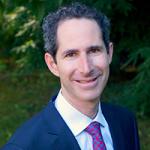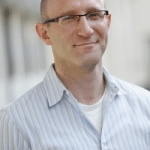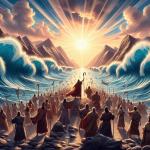The Central Conference of American Rabbis Press has recently published a book, Lights in the Forest, asking a host of rabbis to answer twelve “essential questions” regarding Judaism and Jewish life. They didn’t ask me, but that won’t keep me from answering their questions anyway. I am posting this as a summary of sorts of my thoughts, as this will be my last post on this blog. I am using this Rosh haShanah as an opportunity to simplify my workload, and sadly this is one of the things that has to go. I want to thank Kristi and the fine folks at Patheos for hosting me all this time. L’shana tova to you all.
1. What is your concept of God, and how has your view changed through your life? Sitting zazen (Zen meditation) in 1968 “I” disappeared. When I returned I was convinced that all things were a manifestation of the One Thing, which I choose to call God. From that moment on, God, for me, was Reality, that which is happening: YHVH, from h-y-h the Hebrew verb “to be.” I have experienced nothing since then to shake that conviction.
2. What is God’s relationship to suffering and evil?
YHVH is what is. Suffering and evil are interpretations we humans make regarding our experience of what is. Given that we are addicted to our labels, I believe Isaiah has it precisely right when he has YHVH say, “I form light and I create darkness; I fashion peace and I create evil; I, YHVH, do all this,” (Isaiah 45:7). And the author of the Book of Job is right when he has Job tell us that we must accept the good as well as the bad from God (Job 2:10). If we insist on using labels, we must at least recognize that behind these labels is the singular happening of YHVH.
3. What is the connection between God and ethical values?
Ethics and morality are human creations, and while we often create Gods to sanctify our ethics and morality, God as Reality is, as the Book of Job makes clear, amoral. Attaching one’s morality and ethics to God is simply a way of avoiding having to test them against reason. As long as God defines what is good, and we are the creators of God and the labelers of good, then God will always sanction what we believe to be good. That is why God sanctions slavery and abolition, murder and nonviolence, genocide and generosity. God wants what we want because we invent God in our image.
4. In our science-oriented society, how do you speak of God’s role in nature and in history?
To speak of God’s role in nature is to separate nature and God, something I cannot do. Nature is God manifesting in the physical world open to scientific inquiry.
God’s role in history is something else entirely. History is a human construct, and the God of history no less so. Different peoples have different histories, each with its own God (or God–substitute in the case atheistic civilizations) to sanctify its sense of right and wrong, good and evil, etc. God’s role in history is usually to justify why the winners won and the losers lost, and to sanctify whatever it is the winners did in order to win, and whatever they want to do to stay on top. The divine right of kings is a primary example of this.
5. What does it mean to be created in the divine image?
For me this is a way of saying that a wave is created in the image of the ocean. While the wave is not all of the ocean, the ocean is all of the wave. What is true of waves and ocean is true of creation and God. God creates the way an ocean waves. And everything that arises in God does so as God, just not all of God.
6. What does the concept of gender contribute to our understanding of being human?
While sexual differences are rooted in biology, gender is a narrative reflecting culture norms. All gender tells us regarding human nature is that humans create social constructs, and then go on to mistake these constructs for metaphysical realities.
This is why I find Lech lecha so valuable— reading Genesis 12 1-3 as a challenge to free ourselves from the narratives of nationality, ethnicity, family, and, as I interpret the text, gender, race, religion, sexual orientation, and any other narrative that restricts our thinking and conditions us to function in a world of “us verses them” rather than “us and them.” I, like Rabbi Saul of Tarsus, take on this: “there is no Jew or Greek, slave or free, male or female in Christ Jesus,” (Galatians 3:28). “Christ Jesus” is that level of awareness that takes us out of conditioning narratives and into that place were we can be blessings to all the families of the earth, human and otherwise (Genesis 12:3).
7. The terms “grace” (chein), “salvation” (y’shuah), and “love” (ahavah) have been important concepts in Jewish religious vocabulary, but are frequently associated with Christianity. What can these terms mean in our contemporary Jewish lives?
Grace is what is at any given moment. Sometimes awesome, sometimes awful, grace is simply the manifesting divine in and as the present moment. One doesn’t earn grace, or deserve whatever is happening, one simply awakens to what is as it is. This awakening is what I would call salvation. It doesn’t rescue me from reality, but rescues me from my resistance to reality. It is my resistance to what is that brings unnecessary suffering to my life and the lives of others. Rather than avoid reality, or confront reality head on, salvation is the capacity to blend with what is in order to bring about what is next in a manner that enhances compassion and justice, or what I call love.
8. What is your concept of soul and afterlife?
Just as a wave is nothing but the ocean in extension, so I am nothing but God in extension. Just as a wave doesn’t have a “true wave” hidden within it, so I don’t have a “true self” or “soul” hidden within me. Just as a wave returns to the ocean which itself continues waving, so I will return to God as God continues I’ing. There is no “afterlife” because life itself never ends.
9. As liberal Jews who value religious autonomy, how are the concepts of “covenant” (brit) and “commandment” (mitzvah) relevant to us? In what way is the Torah a sacred text for us?
This question is confusing. What is religious autonomy? Is it the right of a religion to define itself as it pleases, or is it the right a person within a religion to define that religion and her religious life as she pleases? Since these questions are being asked in a Reform Jewish context, I am assuming the latter to be the case: Reform Judaism, alone among all Judaisms, celebrates the sovereign self.
In this context, then, the only meaning of brit and mitzvah is personal: you are only part of and obligated to covenant if you personally feel yourself to be so. There are no rules for Reform Jews other than those that speak to you as an individual. Everything is voluntary.
As for the sacredness of Torah, this depends on our understanding of “sacred.” When I say Torah is sacred am I saying that the teachings in Torah—some of which I abhor, others of which I abandon without concern, and some which I value very highly—are somehow meta-human? Or am I simply saying that the handwritten parchment Torah scroll is a fetish demanding more of me than a printed book containing the same Hebrew words?
For me nothing is sacred. Or everything is sacred. Reality simply is, and that is enough.
10. What is a Jewish definition of “being religious” or “having faith”? How does communal prayer fit into the definition?
I imagine that most Jews would equate “being religious” with being observant in the Orthodox sense of the word. And because they do, most Jews don’t consider themselves religious. Again I am guessing, but I imagine that “having faith” means believing that somehow God is real, chose the Jews, gave us Torah, God’s only authentic revelation, and promised us the Land of Israel in perpetuity regardless of who was there before us or after us. I suspect that most Jews lack faith as well.
For me, “being religious” means adhering to the call of God in Genesis 12:1-3: continually freeing myself and others from the conditioning that keeps us from seeing the world as whole and holy, awakening to the unity of all things in, with, and as God, and acting from this unity in a manner that makes me a blessing to all the families of the earth. Given that, “having faith” is trusting that this is possible.
Regarding communal prayer, I would say that such prayer is an affirmation of our communal values. We gather together to remind one another of what we hold most dear. If the values the community celebrates are values you affirm, communal prayer makes sense. If not you should find a different community.
11. Does the Jewish people have a unique vocation among the nations? Do you affirm hope in a “messianic age” (y’mot hamashiach)?
Every people has its unique characteristics, and often these are of great value to humanity as a whole. Regarding the Jewish people I would point to three things that make us unique. First, our capacity for iconoclasm. Having no other gods but God (Exodus 20:3), and then insisting that God is forever in process and hence unknowable (Ehyeh asher Ehyeh, Exodus 3:14) leaves us with the task of unmasking the false gods behind which all people hide and for which too many people are willing to die and murder. Sadly while we are often capable of seeing the idol in other people’s eyes, we often cannot see the idols in our own eyes.
Second, our passion for justice instilled in us since the time of the Abraham. For us justice trumps our conception of God (“Should not the Judge of all the earth do justly,” Genesis 18:25). Justice is not merely retributive but distributive: not only about punishing offenders but about creating a society in which war is abolished and everyone lives in fearless abundnce (Micah 4:4). Sadly, the trauma of the Holocaust and the messianic zeal of contemporary Zionism have blunted our moral sense, and allowed us to abdicate the very values we saw ourselves chosen to embody.
Third, argument and doubt, the hallmark of rabbinic Judaism that has defined us for over 2000 years. Jews are educated to be at home with paradox, to see all sides of a situation, and even to acknowledge that the opinions of those who oppose us are no less d’vrei Elohim Chayyim, the “words of the living God,” then are our own. We believe in arguing for the sake of heaven (Pirke Avot Chapter 5, Mishna 20), that is using argument to move us closer to the truth, and, we believe, closer to a society built on justice and compassion. But again we seem to have abandoned this tradition as well, demonizing those who argue otherwise, and blinding ourselves to the wisdom we once cherished.
Iconoclasm, justice, argument, and doubt are the gifts we Jews offer the world. The problem is that we have largely lost site of them ourselves. We, no less than others, follow the false gods of nationalism, ethnocentrism, wealth, and power. We, no less than others, have twisted justice to serve our own parochial ends rather than the universalist ends affirmed by our greatest prophets. We, no less that others, have ceased to teach our children how to argue for the sake of heaven, and have offered them a simple and simplistic worldview that drives us toward horror when we once saw ourselves as a driving force of hope.
12. Are Jews obligated to enter into dialogue with members of other faith communities? If so, on what basis and toward what end?
Interfaith dialogue is a de facto Jewish necessity, and not a traditional Jewish value: the Israelites didn’t seek to understand the religions of their neighbors but to destroy them (Exodus 34:13); our prophets didn’t seek to understand the priests of Baal, but to defeat them (I Kings 18:40). The purpose of interfaith dialogue for Jews is, in a sense, to establish treaties with other faiths that allow each religion to affirm its superiority vis a vis all others in the privacy of its own institutions, while promising to not act on that affirmation in the public square. So, no, Jews aren’t obligated to enter into interfaith dialogue, but choose to do so as a survival strategy.














